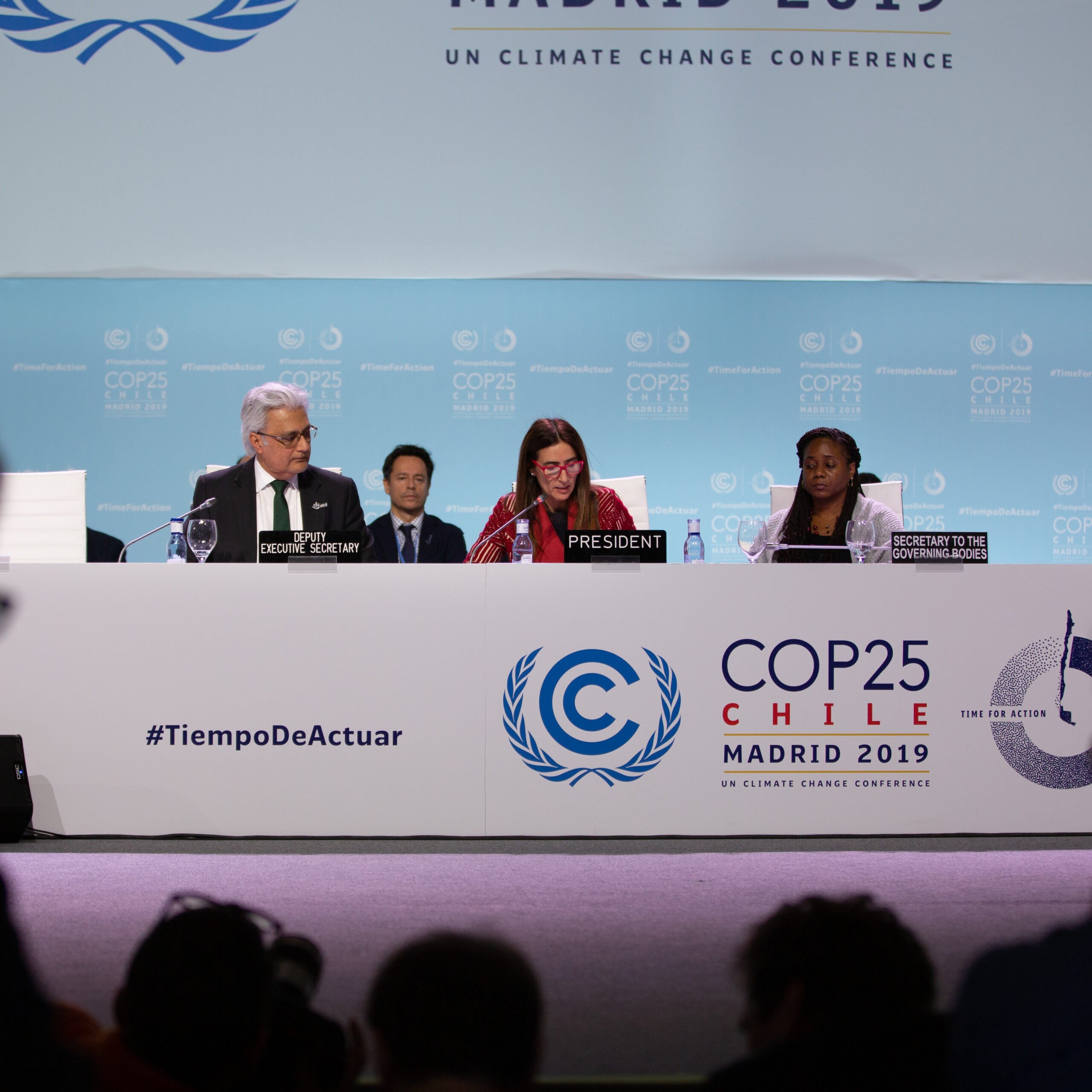
How Sustainable is the UNFCCC Conference of the Parties?
By Chiara Fiorino
The Conference of the Parties (COP) usually hosts between 10,000 and 30,000 participants. This includes representatives of the Parties as well as observers from Non-Governmental Organizations (NGOs), the media and press, and educational institutions.
The scale of these events, and the number of participants, has previously been associated with large emissions of greenhouse gases (GHGs). To illustrate, COP15 in Copenhagen emitted 26,274.41 tons of CO2 equivalent (tCO2e); COP17 in Durban registered 25,048.15 tCO2e; and COP24 in Katowice resulted in a total of 59,020 tCO2e, which is equivalent to flying from Paris to New York and back once a year for 60 years [1,2,3]. Among others, the main sources of emissions areö participants’ air travel from around the world to the host country; local transportation between hotels and the conference venue; energy consumption during the conference itself, and waste generated before, during and after the COP [2].
Looking ahead to COP26
In order to reduce the substantial carbon footprint of COPs, the UK government, alongside Italy, has pledged to deliver a “carbon-neutral” COP26 [4]. The UK government aims to use the United Nations Environment Programme (UNEP) Sustainable Event Guide and the United Nations Framework Convention on Climate Change (UNFCCC) conferences handbook, which contains a chapter on sustainable conferences. These will guide its planning process and promote actions to reach climate neutrality [4-6]. For the UK government, fulfilling climate neutrality means estimating all the GHG emissions of the conference, reducing said emissions as much as possible, and offsetting the residual emissions by purchasing certified emission reduction credits (CERs) [6].
However, not all GHG emissions sources fall officially under the responsibility of the host country. The UNFCCC handbook distinguishes two categories of CO2 emissions: those generated from activities that occur at the conference venue and those generated from participants’ (long-distance, air) travel to the COP [6]. Whereas the host country is required to reduce and offset the former, the latter is the responsibility of participants themselves.
Offsetting carbon emissions
As long-distance travel is by far the greatest source of emissions at COPs, it is critical that participants know how they can reduce their carbon footprint [5]. One option attendees have to reduce their travel emissions is to reach the host country in a sustainable way. “Rail to the COP” is an initiative promoted by the Youth for Sustainable Travel (YFST), which encourages more participants to travel to COP26 by train [17]. However, as COPs involve people from all over the world, the train is not always an available option. The UNFCCC Climate Neutral Initiative allows participants to compensate for unavoidable emissions through a range of projects that sell CERs [8].
Since COP13 in Bali, host countries have started offsetting the emissions generated by registered participants with the support of the UNFCCC Secretariat. The Secretariat can assist in estimating travel-related emissions using the ICAO air travel carbon emissions calculator, which is widely used across UN organizations for the same purpose [6].
Food at COP
The UNFCCC rulebook suggests that food menus should include a balanced variety of meat and vegetarian food [6]. This is because a large proportion of the COP-associated emissions arise from food production and transportation. However, at COP24 in Katowice, 80% of meals were not vegetarian or vegan [9]. Consequently, the food served at COP24 was associated with GHGs emissions “equivalent to 3,000 people flying across the world from New York to Katowice” [10].
For these reasons, a group of people attending COP25 in Madrid acknowledged and exposed the contradiction between the intent of the conference and the food that was served at the venue [11]. A call to action immediately followed such criticism: the Food@COP campaign demands the UNFCCC “to serve plant-based food at its climate-related events” [10].
To address the carbon footprint of catering, the Scottish Event Campus (SEC) – the physical venue of COP26 – has recently published its Sustainable Food Strategy [12]. The strategy aims to offer a broad range of Scottish-sourced plant-based food, alongside low-impact and local dairy products [12]. Although the Food@COP campaign positively received this initiative, the official menu of COP26 has not been published yet, therefore it might be too soon to claim that climate-friendly food will be served at the COP [13].
It is worth noting, however, that food is not included as a GHG emissions source in the standard COP emissions inventory [6]. Since the carbon footprint of catering is not accounted for, its emissions cannot be adequately offset. Without properly offsetting all emissions sources, COP26 will not reach its goal of net-zero emissions, resulting in a low-carbon event rather than a climate-neutral conference.
Climate-aligned sponsorship
Another issue that might compromise the overall sustainability of COP26 is related to sponsorship. The UK government stated that it would sign sponsorship agreements with companies and organisations that:
- Can share their resources and knowledge to make COP26 a success;
- Help to deliver international action on climate change;
- Are making real contributions to the fight against climate change;
- Are aligned with the aims of COP26;
- Have set ambitious net-zero commitments for 2050 or earlier, with a credible short-term action plan to achieve long-term climate targets [14].
The above criteria also apply to the Pre-COP: the final official UNFCCC ministerial meeting ahead of COP26. However, not all sponsors of the Pre-COP fulfill these requirements.
The list of companies who have sponsored the Pre-COP in Milan includes fossil fuel organisations [15]. Firstly, Enel has been accepted as a sponsor, despite planning to build two new gas-fired power plants in Brindisi and Civitavecchia [16]. Secondly, Edison has sponsored the Milan summit even though it is the promoter of the mega gas pipeline EastMed-Poseidon, which will pave the way for exploitation of the enormous gas fields in the Eastern Mediterranean [16]. A2A is also sponsoring the event, despite the fact that it will be taken to court following COP26 under charges of crime due to environmental disaster [16]. Not only are these companies not aligned with the aims of COP26 and the main goal of the UNFCCC, but their actions hinder international efforts to fight climate change.
The same issue seems to apply to COP26 itself. Among the principal partners of the UN conference is Unilever [14]. Despite reaching the top of the 2017 Dow Jones Sustainability Index, Unilever is the world’s largest buyer of palm oil, a product that has led to many human rights abuses and negative environmental impacts [18, 19]. Another controversial partner of COP26 is the Boston Consulting Group (BCG) [14]. As a France24 article revealed, BCG has strong ties with the world’s leading fossil fuel companies [20]. Considering that both the Pre-COP and COP26 continue to legitimize the enablers of the climate crisis, these conferences risk turning into events showcasing greenwashing.
Featured image courtesy of the UNFCC Flickr Page.
References:
[1] The carbon footprint of COP21 – Frequently Asked Questions. Resource. 23 November 2015. URL: https://unfccc.int/news/the-carbon-footprint-of-cop21-frequently-asked-questions [Accessed 27 September 2021].[2] Tomasz Karpinski, CO2 Emissions Related to COP24 Conference in Katowice, The National Centre for Emissions Management and Institute of Environmental Protection – National Research Institute, https://cop24.gov.pl/fileadmin/user_upload/files/COP24_emissions_EN.pdf [Accessed 27 September 2021].
[3] What exactly is a tonne of CO2?, Energuide.be, https://www.energuide.be/en/questions-answers/what-exactly-is-a-tonne-of-co2/2141/ [Accesses 5 October 2021].
[4] The Conference: Sustainability, UN Climate Change Conference UK 2021, https://ukcop26.org/the-conference/sustainability/ [Accessed 23 September 2021].
[5] UNEP, Sustainable Events Guide: Give your large event a small footprint. 2012. URL: https://uist.acm.org/uist2019/sustainability/SustainableEventsGuideMay302012FINAL.pdf [Accessed 27 September 20201].
[6] United Nations Climate Change, How to UNFCCC COP. A handbook for hosting United Nations Climate Change Conferences, https://unfccc.int/resource/docs/publications/how_to_cop_unfccc.pdf [Accessed 23 September 2021].
[7] Tara Bernoville, What is the difference between carbon-neutral, net-zero and climate positive?, PlanA Academy, https://plana.earth/academy/what-is-difference-between-carbon-neutral-net-zero-climate-positive/ [Accessed 27 September 2021].
[8] United Nations Climate Change, COP23 Sustainable Conference, https://cop23.unfccc.int/process-and-meetings/conferences/un-climate-change-conference-november-2017/about/sustainable-conference#eq-2 [Accessed 27 September 2021]. For the Carbon Neutral Initiative platform, please visit: https://offset.climateneutralnow.org
[9] Laura M. Lombrana and Deena Shanker, There’s Only One Vegan Food Truck at Save-the-Planet Talks, Bloomberg, https://www.bloombergquint.com/business/-it-s-an-irony-at-climate-forum-there-s-one-vegan-food-truck [Accessed 30 September 2021].
[10] Food@COP – a youth-led initiative for climate-friendly catering at COP26. Diet Change not Climate Change, https://dietchangenotclimatechange.com/blog/foodcop-a-youth-led-initiative-for-climate-friendly-catering-at-cop26/ [Accessed 27 September 2021].
[11] Guest Author, Food@COP, ClimaTalk ,https://climatalk.org/2021/07/02/foodcop/ [Accessed 27 September 2021].
[12] Scottish Event Campus, Sustainable Food Strategy, https://www.sec.co.uk/sustainability-csr/sustainable-food-strategy [Accessed 27 September 2021].
[13] Food@COP Instagram Post, https://www.instagram.com/p/CTFPKHijfE4/ [Accessed 27 September 2021].
[14] Partnership and support, UN Climate Change Conference UK 2021, https://ukcop26.org/uk-presidency/partnerships-and-support/ [Accessed 27 September 2021].
[15] Pre-COP26, All4Climate, https://all4climate2021.org [Accessed 27 September 2021].
[16] Alessandro Runci, L’industria fossile conquista la Pre-COP di Milano,https://www.recommon.org/industria-fossile-conquista-la-pre-cop-di-milano/ [Accessed 27 September 2021].
[17] About us: Our mission, Rail to the COP, https://railtothecop.com/about/mission [Accessed 3 October 2021].
[18] SDG Nederland, Unilever,: https://www.sdgnederland.nl/user/unilever/ [Accessed 9 October 2021].
[19] Daphné-Dupont-Nivet, Inside Unilever’s Sustainability Myth, New Internationalist, https://newint.org/features/web-exclusive/2017/04/13/inside-unilever-sustainability-myth [Accessed 4 October 2021].
[20] France24, UK’s oil consultant contract for climate talks sparks concern, https://www.france24.com/en/live-news/20210310-uk-s-oil-consultant-contract-for-climate-talks-sparks-concern



